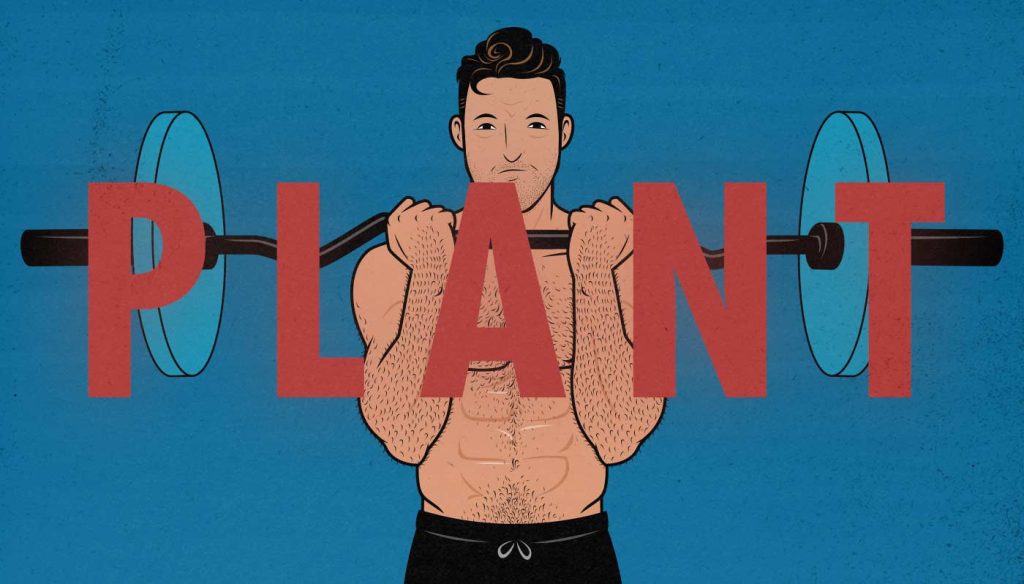
How to Bulk on a Vegan Diet (Plant-Based Bulking)
Vegans can build muscle just as quickly and effectively as anyone else, provided they eat a proper plant-based bulking diet. Vegans tend to be healthier than the average person (study), and plant-based diets lend themselves quite well to building muscle. After all, many of the best bulking foods are plants: bananas, oats, rice, legumes, leafy greens, carrots, garlic, and so on (study).
We’ve been helping skinny guys bulk up for over a decade now, and our vegan members have always done just as well as everyone else.
Still, there are a few common mistakes vegans make. And there are some extra considerations to keep in mind. Let’s go through all of it.
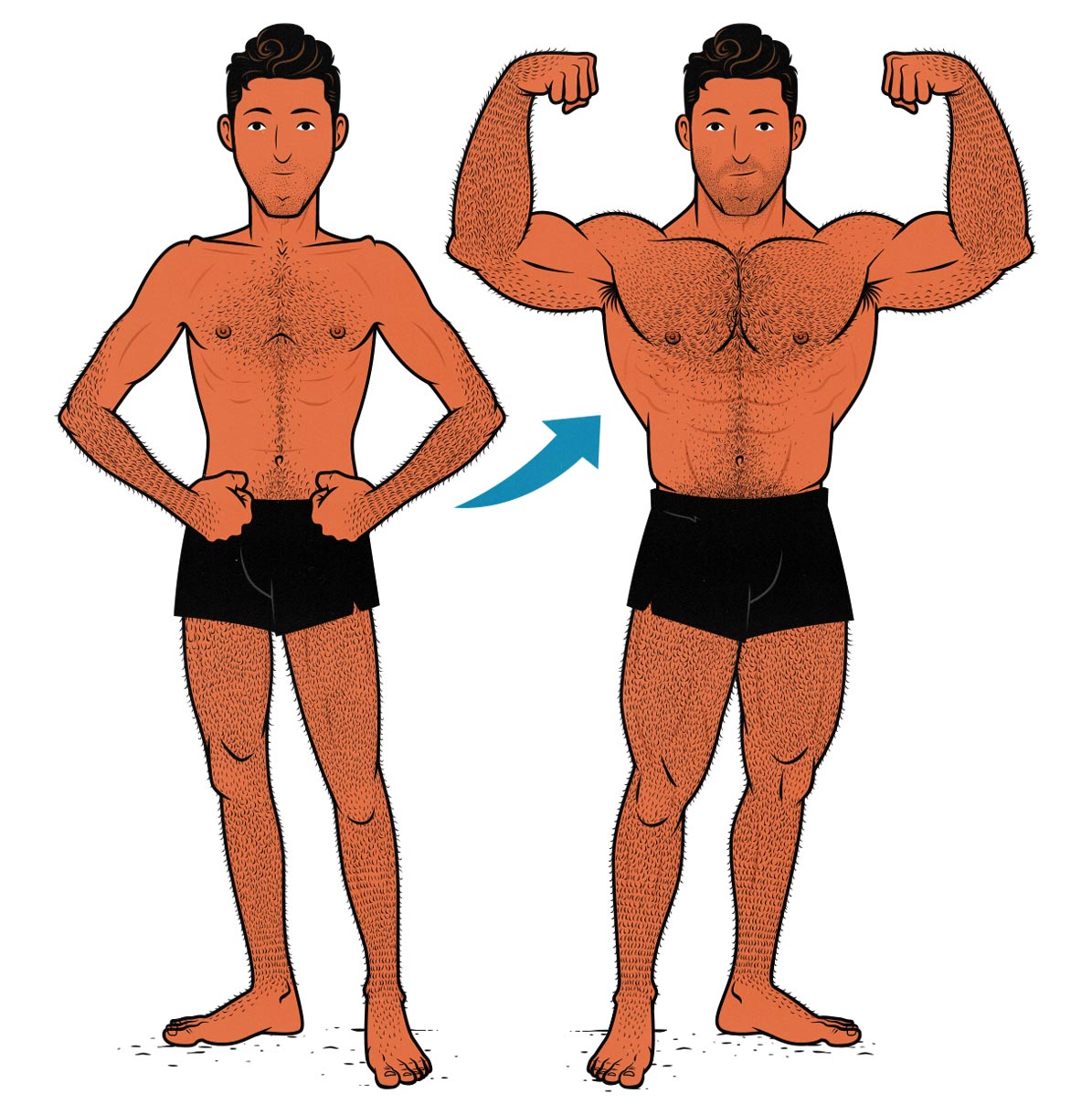
Yes, Plant-Based Diets Can Cause Weight Loss
Before we dive deep into plant-based bulking, we should address the mouse in the room: plant-based diets are associated with weight loss (study). This is the same problem we see with intermittent fasting and ketogenic diets. People tend to lose weight when they restrict food groups. As skinny guys trying to bulk up, that’s horrifying.
However, unlike intermittent fasting and keto, I think vegans can get around this problem quite easily. All the best bulking foods, such as nuts, seeds, fruits, whole grains, legumes, starchy carbs, and protein powder, are still on the table.
Just to make sure you don’t have a problem gaining weight, though, we’ll teach you how to eat more calories at the end of the article.
No, Plant-Based Diets Aren’t Bad for Building Muscle
Vegans can build muscle as quickly as people eating omnivorous diets (full research breakdown). Going vegan won’t save you from needing to eat a high-quality diet, but that’s true for everyone. If you want to build muscle quickly and leanly, you should get the vast majority of your calories from a balanced mix of minimally processed foods.
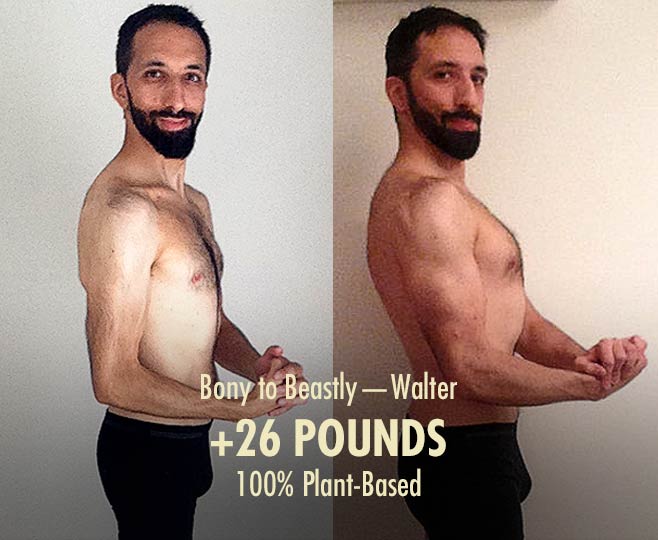
The challenge with bulking on a plant-based diet is that if you do it carelessly, you might not consume enough protein. You probably already knew that. That’s the common criticism people lob at vegans. Still, it’s important, so we’ll cover plant-based protein requirements in a moment.
We also need to make sure you aren’t undereating nutrients that help with hormone production and muscle growth. The obvious example is creatine, which is largely found in animal products. But we can go one by one through all of them.
To quote one of the leading bodybuilding researchers, Eric Helms, PhD:
There’s no reason a well-designed vegan/vegetarian diet can’t be just as effective at building muscle as a diet that includes meat.
Eric Helms, Ph.D.
How to Bulk on a Plant-Based Diet
The most important part of building muscle on a plant-based diet has nothing to do with eating a plant-based diet. The most important principles are the same for everyone. Here’s a quick summary of how to bulk:
- Follow a good workout routine: The more muscle growth your workouts can stimulate, the more quickly and leanly you’ll be able to build muscle. This becomes increasingly important as you gain more lifting experience.
- Make sure you’re gaining weight: You build muscle out of the food you eat. Eating extra food allows you to build extra muscle. Most skinny beginners benefit from gaining about a pound per week, which means about 500 extra calories per day. You can track your calories if you want, but you don’t need to. The important thing is to eat on a consistent schedule, weigh yourself every week, and add more food to your diet whenever your weight gain stalls.
- Eat enough protein: Aim for around 0.7–1 gram of protein per pound of body weight per day (study). You can get plenty of protein from peanuts, peas, soy, seeds, nuts, legumes, whole grains, and various other plant-based foods, which is often enough to hit that target. However, it’s nice to have some plant-based protein powder on hand, too, for convenience.
- Eat protein often enough: Aside from hitting your daily protein target, it also helps to have at least 20 grams of protein per meal and 3–5 meals per day. That will stimulate a little bit of extra muscle growth with every meal. The muscle growth that protein-rich meals stimulate pales in comparison to what a good workout can do, but when you combine both effects together, it can help you build muscle a little faster.
- Get your macros right: the best bulking diets tend to be high in carbs, moderate in protein, low in fat. Plants are a rich and varied source of carbohydrates, so vegan diets tend to be great for this. For fats, you can eat plenty of nuts/trail mix, blend avocados into your smoothies, and drizzle olive oil on your veggies. There’s also peanut butter, which is rich in protein, fat, and calories.
- Sleep like a Beast: try to get at least 7 hours of high-quality sleep every night. I understand if you can’t, but getting plenty of sleep will help you build muscle more quickly and leanly.
How to Eat a Good Plant-Based Bulking Diet
In this section, I want to cover the fundamentals of a good vegan bulking diet. If you’re already following a good vegan diet, you’ll already know most of this stuff. For example, you might already take a multivitamin that includes vitamin B-12. I’m going to go over some stuff that only applies to bulking, though, so I’d still give this section at least a skim.
We’ll quickly go over pescatarian and vegetarian bulking diets, and then we’ll go into greater detail on fully vegan diets.
Disclaimer: although Marco is certified to give diet advice, this goes beyond his area of expertise, so this section is based on the recommendations of Eric Helms, PhD. However, even then, you should still check with a physician or registered dietician before making any drastic changes to your diet.
Pescatarian Bulking
Bulking as a pescatarian is just like bulking as a non-pescatarian. Although you’re restricting some types of meat, you’re still eating seafood and dairy, so your diet will still include all of the regular nutrients. You may want to supplement with protein powder and creatine, and you might run into a vitamin D deficiency during the winter, but that stuff applies to everyone who’s bulking up.
Vegetarian Bulking (Lacto-Ovo)
For lacto-ovo vegetarians, what’s being restricted is meat, so we need to consider the nutrients that are mainly found in meat:
- Vitamin B-12 (the most common deficiency among vegetarians)
- Creatine (which helps with building muscle mass)
- Iron (mainly an issue for women)
- Beta-alanine, taurine, carnitine
- Omega-3 fatty acids
- Creatine
Vitamin B-12: it’s extremely common for vegetarians to gradually develop a vitamin B-12 deficiency (study, study) which can have severe consequences if left unaddressed. In addition to Dr Helms’ recommendation, we can also quote the Mayo Clinic:
Vitamin B-12 is necessary to produce red blood cells and prevent anemia. This vitamin is found almost exclusively in animal products, so it can be difficult to get enough B-12 on a vegan diet. Vitamin B-12 deficiency may go undetected in people who eat a vegan diet. This is because the vegan diet is rich in a vitamin called folate, which may mask deficiency in vitamin B-12 until severe problems occur. For this reason, it’s important for vegans to consider vitamin supplements, vitamin-enriched cereals and fortified soy products.
You may or may not be deficient in any of the other nutrients, but these are the ones to watch out for. Most experts recommend getting your blood work done and then adjusting your diet and supplements accordingly.
Protein quality doesn’t tend to be an issue for vegetarians. That’s because vegetarians still have access to dairy and eggs, which are complete sources of protein. That means that all of the classic bodybuilding protein sources are still available:
- Whey protein
- Greek yogurt
- Cottage cheese
- Cheese
- Eggs
- Milk
What’s interesting is that dairy tends to be a higher-quality source of protein than meat due to its higher leucine content. According to Dr Helms, this means that vegetarians who consume eggs and dairy actually need to consume a little bit less protein than people who eat meat. This would be a situation where a target of 0.8 grams per pound body weight per day might work well for bulking.
Of course, if you’re trying to minimize the animal products in your diet, you by no means have to get your protein from eggs and dairy. In fact, the research on pea protein powder shows that it might even have some advantages over whey protein (due to an even higher leucine content).
Vegan Bulking (Fully Plant-Based)
If you’re restricting all animal products, we’ve got to account for the nutrients that are found in animal products, including those in meat:
- Vitamin B-12 (the most common deficiency among vegans)
- Creatine (which helps with building muscle mass)
- Iron (which isn’t as much of a concern for men)
- Beta-alanine, taurine, carnitine
- Omega-3 fatty acids
- Creatine
As well as those found in eggs and dairy:
- Complete proteins
- Vitamin D
- Calcium
- Iodine
- Zinc
Vitamin B-12: As with vegetarians, B-12 is the most common deficiency (study, study). As covered above, most experts recommend that vegans take b–12 vitamins.
Creatine: the more creatine you have in your muscles, the more quickly you’ll be able to build muscle (meta-analysis). Since creatine is naturally occurring in meat, vegans consume less of it (study, study) and thus have more to gain by supplementing with it (study). The side effects of creatine tend to be positive in vegans, too, with research showing that it may improve mood and cognitive function (study). All creatine supplements are 100% plant-based, too, so there’s no worry there.
Calcium and zinc: Many plants contain calcium and zinc, but those same plants often contain phytates and oxalates, reducing nutrient absorption (study, study). It’s not that plant-based diets aren’t rich in these nutrients; it’s just that vegans need to eat more of them. Mind you, bulking means eating an abundance of food and calories, so this won’t necessarily be a problem.
Vitamin D: you can get plenty of vitamin D from the sun, but the sun won’t help you if you live like a vampire. This isn’t a problem unique to vegans, though. Most people are deficient in vitamin D, especially during the winter (study). Vitamin D is notable for vegans, though, because they don’t eat dairy that’s fortified with it (study, study). That means that they may need to supplement with it directly. When doing so, keep in mind that D3 is the most effective form of Vitamin D and that only lichen-based D3 supplements are plant-based.
Beta-alanine: beta-alanine is a mediocre bulking supplement overall, causing unremarkable increases in muscle mass in most people (study). However, since plant-based diets are lower in carnosine (study), and since beta-alanine increases muscle carnosine content, this might be a more worthwhile supplement for vegans (study).
You could say the same about carnitine (study) and taurine (study), which are common ingredients in pre-workout supplements, but that’s going pretty far down the supplement rabbit hole, and might very well be overkill for you.
Omega-3 fatty acids: vegan diets are lower in omega-3 fatty acids (study), and there’s preliminary evidence that getting enough omega-3s might improve body composition (study). It’s also a good idea to have omega-3s in your diet from a general health perspective. To quote the Mayo Clinic:
Because conversion of plant-based omega-3 to the types used by humans is inefficient, you may want to consider fortified products or supplements or both.
Iodine: Most people get their iodine from iodized salt (and all standard salt is iodized), so chances are that you’re just fine. However, if you aren’t eating iodized salt, in that case, vegans have a higher incidence of iodine deficiency (study). This probably won’t be an issue unless you’re getting your salt from atypical sources, but it’s something to keep in mind.
Complete proteins: the final thing to keep in mind is that plant-based protein is considered “incomplete” because it contains only some of the essential amino acids. Different plants have different amino acid profiles, though, so by eating a wide variety of plant-based protein sources, you can get complete protein intake overall. Protein is quite important while bulking, though, so let’s dive one level deeper, going in-depth on plant-based protein sources.
Overall Best Practices
Your diet may not be low in anything other than vitamin B-12 and creatine, but it’s still a good idea to keep these nutrients in mind. As with vegetarians, the best approach is to get a blood test and then adjust your diet and supplements accordingly.
As a general rule of thumb, you may want to get some extra sunlight to take care of your vitamin D levels, you may wish to intentionally include calcium-rich plants in your diet, and you may want to take a DHA supplement sourced from algae. Combine that with a standard 5-gram dose of creatine every day, and you’ve got yourself a pretty good vegan bulking diet.
To fully cover your bases, though, Dr Helms recommends the following supplements for vegan bodybuilders:
- Multivitamins for vegans (including vitamin b-12)
- Pea protein powder (usually blended with rice protein)
- DHA (sourced from algae)
- Vitamin D3 (sourced from lichen)
- Creatine (perhaps with beta-alanine, carnitine, and taurine)
The Best Plant-Based Protein Sources
Most research shows that having at least 0.8 grams of protein per pound per day is ideal. However, given the varying protein quality of plant-based proteins, vegans tend to get better bulking results when they eat at least 0.9 grams/lb/day. For a 150-pound person, that means eating 135 grams of protein per day.
Do with this what you will, but I think there are even benefits to aiming slightly higher still:
- As naturally thin people, we tend to underestimate how much we eat. If we make this same mistake with our protein intake, eating 0.7 grams instead of 0.9 grams, that’s going to mean less muscle gain and more fat gain, which can be discouraging (and confusing).
- Foods often have less protein than advertised. For example, when testing protein powders, the researchers found that most had around 20% less protein than was listed on the label. This would cause people aiming for the bare minimum to fall short of their protein goals, whereas people aiming for a higher protein intake would be unaffected.
- Things don’t always go according to plan. Maybe you need to eat a different meal than planned, you’re too full to finish your dinner, or my wife steals one of your pieces of tempeh. (That may not be an issue for you, but she’s always stealing mine.) If you’re aiming at the bare minimum, this is a problem. If you’re aiming a little high, no worries.
This is why, if you’re able, we recommend trying to get a full gram of protein per pound of body weight per day. This makes your diet resilient enough to withstand the mistakes we all make (some of which aren’t really under our control, such as incorrect information on nutrition labels).
Anyway, this is where protein powder comes in. If you buy some plant-based protein powder, these protein problems disappear. Plus, orotein powder has the advantage of being easy on your appetite, making it easier to gain weight.
Toss a scoop of protein powder into your breakfast smoothie, have a scoop alongside any meals that have less than 20 grams of protein in them, and have a couple of scoops after lifting weights. Simple and easy.
Which protein powder should you get? Blends of different plant-based protein sources tend to be best (such as pea + rice protein). Soy protein powders are fine, too, so long as you consume a moderate amount. If your diet is already high in soy products, though, it’s probably wise to vary your protein intake by getting a pea-based protein powder.
Let’s go over the research on both options as it relates to bulking:
Is Soy Protein Good for Bulking?
Until recently, soy protein was touted as the best plant-based protein source. There’s a good reason for that, too: it has a wonderfully balanced amino acid profile, making it great for building muscle. As a result, many bodybuilders have built strong physiques out of soy.
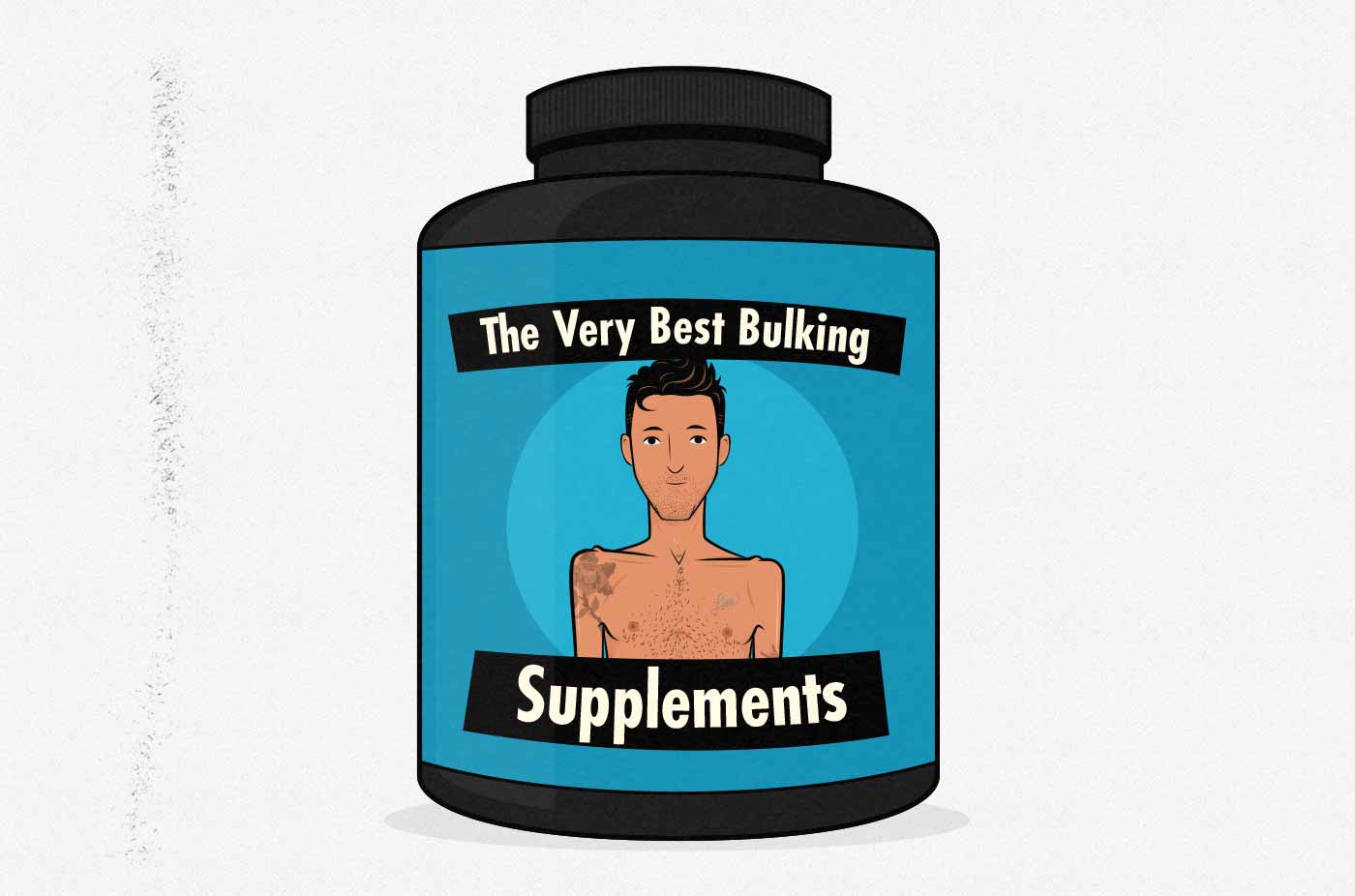
However, there’s been some controversy, too. Some studies found it lowered testosterone in men, causing bodybuilders to fear it. However, the most comprehensive meta-analysis found that soy doesn’t reduce testosterone production. It seems to have been a false alarm.
Then new alarms went off, this time connecting soy protein to sperm count. Again, it’s hard to tell what’s going on here. Some studies show it can reduce our sperm count, whereas others show no effect.
We don’t have any conclusive answers yet, but one hypothesis for why soy only affects some guys some of the time has to do with varying gut bacteria. The idea is that having different gut bacteria causes us to digest soy differently, leading to about ⅓ of men having a negative reaction when they consume high quantities of it.
Speaking of “high quantities,” the final thing to consider is the dose. There haven’t been any negative effects detected with lower doses of soy protein. It’s only when soy is consumed in large quantities that it might impact hormones.
I’ll keep this section updated as new research comes out. In the meantime, Dr. Helms recommends limiting yourself to one serving of soy per day, just to play it completely safe. At such a low intake, he’s confident you’ll get the benefits of the extra protein without risking any hormonal effect.
Vegan Whey: Pea + Rice Protein
The amino acid most responsible for stimulating muscle growth is leucine, which is relevant to vegans because plant-based protein sources tend to be lower in it. However, soy is fairly high in leucine, rice protein has even more, and pea protein has a ton—more than whey protein.
In fact, because of that extra leucine, one 12-week bulking study found that pea protein was trending to produce more muscle growth than whey:
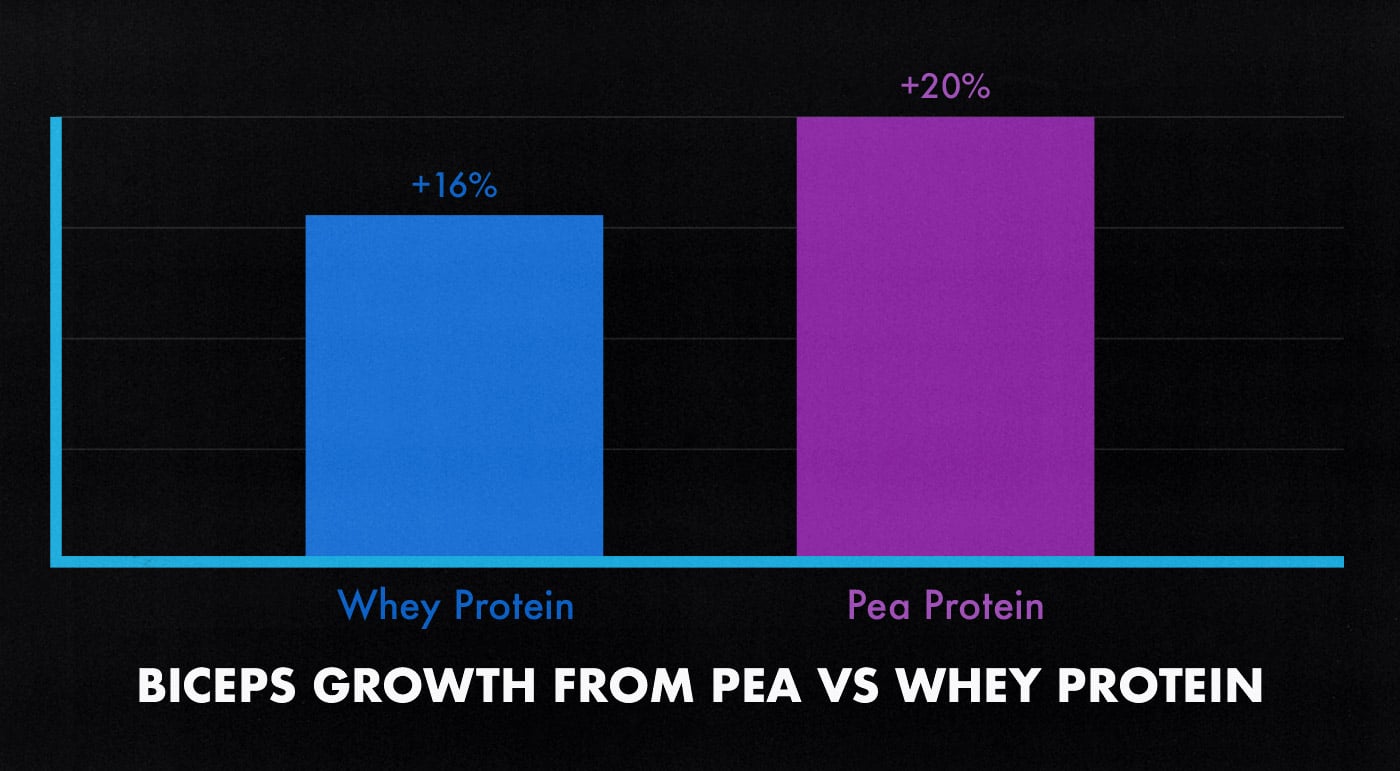
To be clear, the difference wasn’t statistically significant, so we can’t use this as evidence that pea protein is better than whey (yet). Still, if you look at the muscle growth shown above, you’ll see that pea protein certainly makes for a great protein powder.
However, although pea protein is a great source of leucine, it’s low in two other amino acids: methionine and cysteine. That doesn’t seem to affect muscle growth, but just for general health, it’s wise to have a balanced intake of amino acids.
That’s where rice protein comes in. It has plenty of methionine and cysteine, it just doesn’t have as much leucine. So, if we use pea protein as a base and then mix in a little rice protein, we get a completely balanced protein source with a great mix of all the amino acids. That’s why pea + rice protein blends are so good for building muscle. Mind you, you’re free to buy a pure pea protein and then get other sources of protein elsewhere in your diet.
How to Gain Weight on a Plant-Based Diet
We have a full guide on how to eat more calories. It mainly comes down to:
- Eat more often. That way, your meals won’t need to be so enormous that they leave you feeling stuffed and tired.
- Eat calorically dense foods, such as high-calorie smoothies, trail mix, stews, and energy balls. Here are some of my favourite vegan bulking recipes.
- Never fall behind on calories. If you skip a meal, you’ll need to double up later in the day. That can be really rough on your stomach.
- Weigh yourself every week and adjust your calories accordingly. It can help to track your calories, but you don’t need to. All you need to do is eat a little more food whenever your weight gain stalls for more than two weeks in a row.
If you’re having a hard time, let me know in the comments. I’ve been helping naturally skinny people bulk up for over a decade. We can probably figure it out together.
Research Updates
2021 Study Comparing Vegan vs Omnivorous Diets
A 2021 study by Hevia-Larraín et al. pitted vegan and omnivorous diets against one another, seeing if there were any differences in muscle growth or strength gains after twelve weeks of bulking.
Both groups were instructed to eat at least 0.7 grams of protein per pound bodyweight per day. For someone weighing 150 pounds, that’s at least 105 grams of protein per day. That might be a little low for ideal results, but it’s certainly enough protein to build muscle out of.
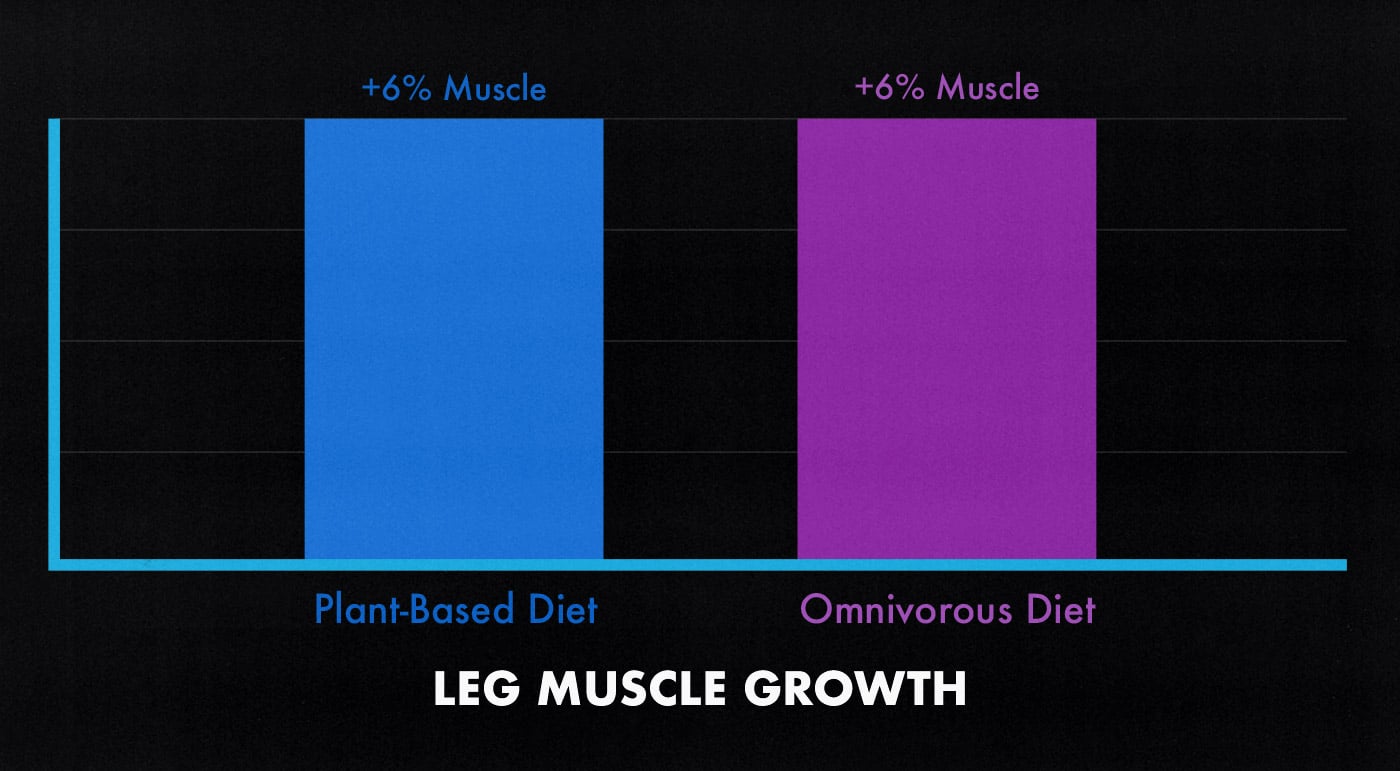
When comparing gains in lean mass, gains in strength, and increases in muscle size, both diets were found to produce the same results. As you can see in the graph above, if we look at the differences in muscle growth in the legs, there’s a tiny, slight bit of extra muscle growth from the vegan diet, but we’re talking about a small fraction of a percentage point, and it wasn’t anywhere close to reaching statistical significance.
This study shows that people can build muscle equally well when following a vegan diet versus an omnivorous diet, showing that vegan diets are absolutely viable for bulking.
2023 Study Comparing Plant-Based vs Animal-Based Protein
A 2023 study by Monteyne and colleagues compared the muscle gains of people eating animal-based or plant-based protein sources while following a squat and deadlift program:
- The plant-based protein group gained 3.1kg of lean mass, with a 32% increase in thigh muscle size.
- The animal-based protein group gained 2.6kg of lean mass, with a 33% increase in thigh muscle size.
There were no statistically significant differences in muscle growth (or strength gains) between the two groups. The researchers concluded that eating enough protein is important but that it shouldn’t matter whether that protein is animal-based or protein-based.
Conclusion
Vegans can build muscle just as quickly, leanly, and healthfully as anyone else. In fact, many of the best bulking foods are plant-based: beans, peas, lentils, fruits, nuts, seeds, and so on. You’ll do great. Just like everyone else, your results will hinge on how good your workout program, bulking diet, and lifestyle are.
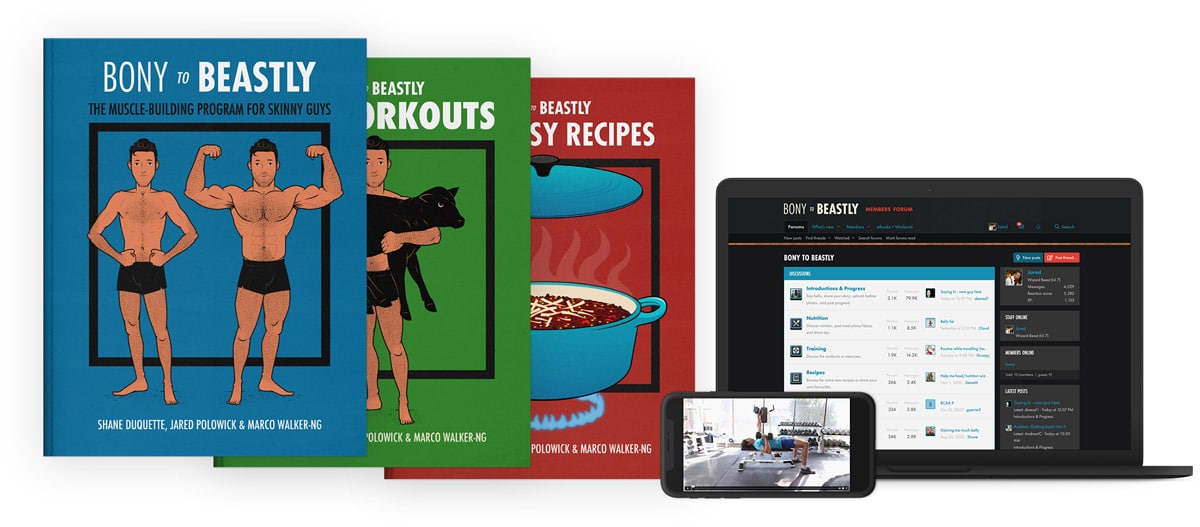
Alright, that’s it for now. If you want more muscle-building information, we have a free bulking newsletter for skinny guys. If you want our foundational bulking program, including a 5-month full-body workout routine, diet guide, recipe book, and online coaching, check out our Bony to Beastly Bulking Program. Or, if you want a customizable intermediate bulking program, check out our Outlift Program.

